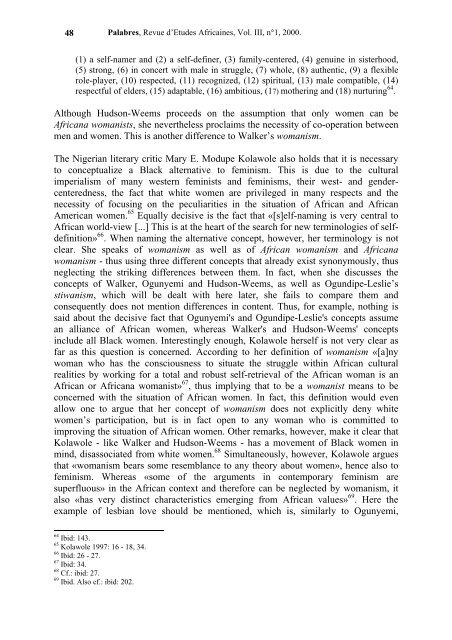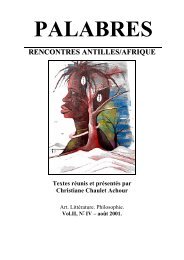Télécharger - Revue Palabres
Télécharger - Revue Palabres
Télécharger - Revue Palabres
Create successful ePaper yourself
Turn your PDF publications into a flip-book with our unique Google optimized e-Paper software.
48<br />
<strong>Palabres</strong>, <strong>Revue</strong> d’Etudes Africaines, Vol. III, n°1, 2000.<br />
(1) a self-namer and (2) a self-definer, (3) family-centered, (4) genuine in sisterhood,<br />
(5) strong, (6) in concert with male in struggle, (7) whole, (8) authentic, (9) a flexible<br />
role-player, (10) respected, (11) recognized, (12) spiritual, (13) male compatible, (14)<br />
respectful of elders, (15) adaptable, (16) ambitious, (17) mothering and (18) nurturing 64 .<br />
Although Hudson-Weems proceeds on the assumption that only women can be<br />
Africana womanists, she nevertheless proclaims the necessity of co-operation between<br />
men and women. This is another difference to Walker’s womanism.<br />
The Nigerian literary critic Mary E. Modupe Kolawole also holds that it is necessary<br />
to conceptualize a Black alternative to feminism. This is due to the cultural<br />
imperialism of many western feminists and feminisms, their west- and gendercenteredness,<br />
the fact that white women are privileged in many respects and the<br />
necessity of focusing on the peculiarities in the situation of African and African<br />
American women. 65 Equally decisive is the fact that «[s]elf-naming is very central to<br />
African world-view [...] This is at the heart of the search for new terminologies of selfdefinition»<br />
66 . When naming the alternative concept, however, her terminology is not<br />
clear. She speaks of womanism as well as of African womanism and Africana<br />
womanism - thus using three different concepts that already exist synonymously, thus<br />
neglecting the striking differences between them. In fact, when she discusses the<br />
concepts of Walker, Ogunyemi and Hudson-Weems, as well as Ogundipe-Leslie’s<br />
stiwanism, which will be dealt with here later, she fails to compare them and<br />
consequently does not mention differences in content. Thus, for example, nothing is<br />
said about the decisive fact that Ogunyemi's and Ogundipe-Leslie's concepts assume<br />
an alliance of African women, whereas Walker's and Hudson-Weems' concepts<br />
include all Black women. Interestingly enough, Kolawole herself is not very clear as<br />
far as this question is concerned. According to her definition of womanism «[a]ny<br />
woman who has the consciousness to situate the struggle within African cultural<br />
realities by working for a total and robust self-retrieval of the African woman is an<br />
African or Africana womanist» 67 , thus implying that to be a womanist means to be<br />
concerned with the situation of African women. In fact, this definition would even<br />
allow one to argue that her concept of womanism does not explicitly deny white<br />
women’s participation, but is in fact open to any woman who is committed to<br />
improving the situation of African women. Other remarks, however, make it clear that<br />
Kolawole - like Walker and Hudson-Weems - has a movement of Black women in<br />
mind, disassociated from white women. 68 Simultaneously, however, Kolawole argues<br />
that «womanism bears some resemblance to any theory about women», hence also to<br />
feminism. Whereas «some of the arguments in contemporary feminism are<br />
superfluous» in the African context and therefore can be neglected by womanism, it<br />
also «has very distinct characteristics emerging from African values» 69 . Here the<br />
example of lesbian love should be mentioned, which is, similarly to Ogunyemi,<br />
64<br />
Ibid: 143.<br />
65<br />
Kolawole 1997: 16 - 18, 34.<br />
66<br />
Ibid: 26 - 27.<br />
67<br />
Ibid: 34.<br />
68<br />
Cf.: ibid: 27.<br />
69<br />
Ibid. Also cf.: ibid: 202.



